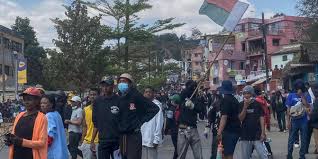
The African Union (AU) has called for restraint, dialogue, and calm as the Indian Ocean nation grapples with violent youth-led protests that have left at least 22 people dead and around 100 injured.
The unrest, driven by so-called “Generation Z” protesters, erupted last week over recurring water and electricity shortages. Thousands of young people gathered in Antananarivo and other cities under the slogan: “We want to live, not survive.”
The Office of the United Nations High Commissioner for Human Rights reported that security forces used force deemed “unnecessary and disproportionate” during the demonstrations.
In a statement on Monday, the Chairperson of the AU Commission expressed deep concern over the escalating situation, which has caused major socio-economic disruption. “We call on all parties to exercise restraint and engage in dialogue to resolve the crisis peacefully,” the statement said.
The AU also reaffirmed its commitment to working with the Malagasy government and the Southern African Development Community (SADC) to facilitate a resolution.
President Andry Rajoelina responded to the protests by announcing the dissolution of his government on Monday.
“We acknowledge and apologize if some members of the government did not fulfill the missions entrusted to them,” Rajoelina said during a nationally televised address.
While the unrest began in the capital, it has since spread to eight other cities, prompting authorities to impose a nighttime curfew. Police deployed tear gas and rubber bullets to disperse crowds amid reports of looting and property damage.
Observers note that the protests mark a rare moment of large-scale youth mobilisation in Madagascar, with Generation Z successfully galvanising public attention around basic infrastructure issues where traditional political opposition has often struggled.
The AU’s call for dialogue comes at a critical juncture, as the country faces the challenge of balancing urgent social needs with restoring public order.
Analysts warn that failure to address underlying grievances could risk prolonging the unrest and further destabilising Madagascar’s fragile political environment.
The situation remains fluid, with the international community closely monitoring developments as both government and civil society actors weigh the path toward a peaceful resolution.



